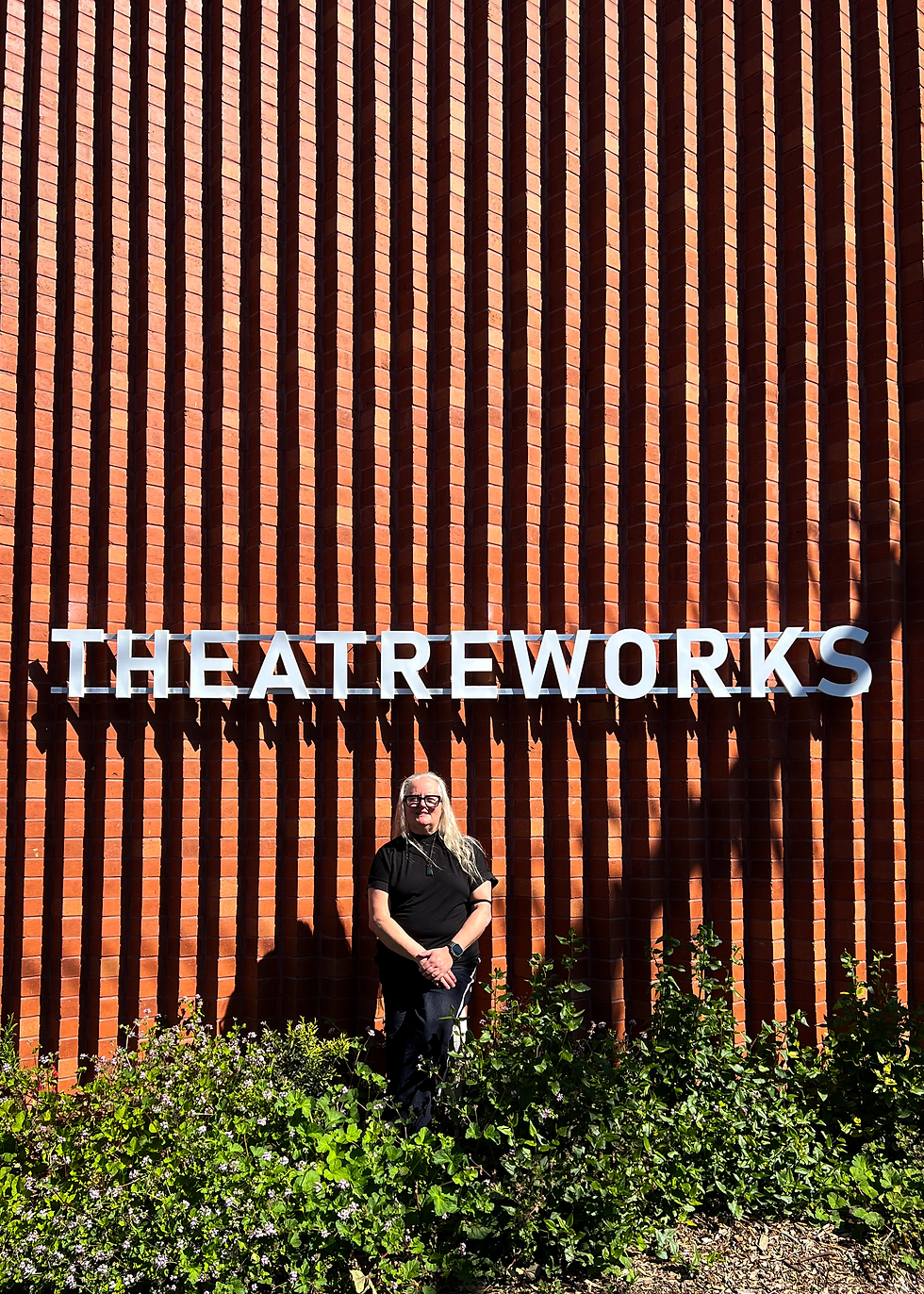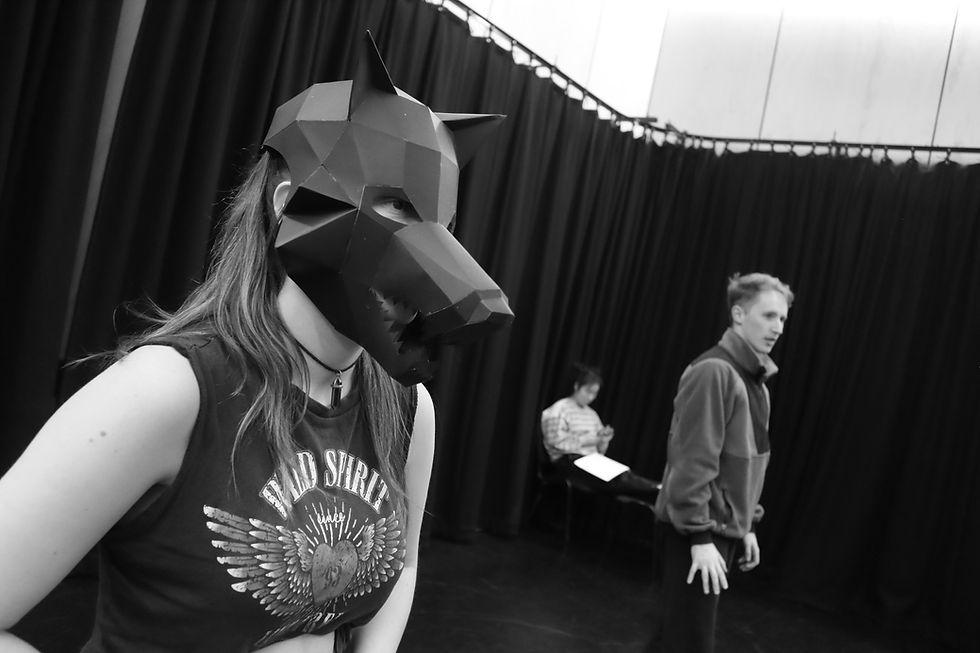In Conversation with Maki Morita
- TW
- Mar 1, 2023
- 5 min read
"I want to celebrate the ability to dream big and strive for a utopia, regardless of the messiness and gigantic hurdles that come with it. Because if no one was brave enough to chase something better, things would sure be bleak." We chat with writer Maki Morita about their latest work 'Trash Pop ButterFlies, Dance Dance Paradise' scheduled to premiere at Theatre Works this March.

Q: What inspired you to write Trash Pop Butterflies, Dance Dance Paradise?
A: I started writing Trash Pop Butterflies, Dance Dance Paradise (AKA Trash Pop) when there was a heavy sense of uncertainty and hopelessness in the air as bushfires tore across this country and the pandemic came about. Climate change felt more real than ever, and I wanted to do something about everything going wrong in the world… but I felt like I had little voice or power. I felt confused. I felt frustrated. I felt overwhelmed. Sometimes I just wanted to jump around and dance to crazy loud music and forget about it all, but then I felt kinda guilty. So I guess I decided to write a play instead. Look, this might not be the most practical way of saving the world, but we can’t all be Greta Thunberg.
Trash Pop is ultimately a response to our collective state of climate anxiety, but it’s not all doom and gloom… I promise! Imagining how a group of young activists might plot their ecofeminist revolution brought a lot of joy to surface too.
Q: What are some key themes explored in this work?
A: Climate anxiety is a big one of course, and how it’s affecting our generation. An existential threat like the world ending can make us do crazy shit and have breakdowns and yell at people and be hypocritical in our actions, and I wanted to explore how far that could be taken. You can really care about something but have no idea where to start when it comes to instigating change. That’s okay though. We’re all figuring it out as we go along… right? In Trash Pop, youthful rebellion is enacted in all its idealistic grandeur, but the reality of what it takes to start a revolution comes crashing down on the three young women at the heart of it. They struggle with following things through and bearing any sort of responsibility. But it’s not a criticism. I want to celebrate the ability to dream big and strive for a utopia, regardless of the messiness and gigantic hurdles that come with it. Because if no one was brave enough to chase something better, things would sure be bleak.
The silencing and abuse these young women have experienced is also a testament to hierarchies of power, and who gets to be taken seriously in our society. I’ve learnt that being a queer femme and a Person of Colour doesn’t automatically come with much authority — you have to prove you have a voice and advocate for it. It can be easy to gaslight yourself, and make yourself smaller and smaller because a lot of people (mostly privileged straight white dudes) brush you off or don’t seem to think your opinions are all that important. How we navigate structures of authority while staying true to ourselves is another key theme in the work.
Hierarchies of power and knowledge also play into our relationship with the natural world, where the wisdom of non-human life is often dismissed. To counter this, Trash Pop includes an animist perspective on the current state of our environment, where butterflies wonder what these phone-things we’re so obsessed with are all about and tadpoles resort to eating each other from drought-induced starvation. These offbeat, tragic moments from the natural world compliment the interaction between human characters in the play.
Q: What have you most enjoyed about the development and rehearsal process so far?
A: I’ve worked with so many talented and dedicated creatives throughout the lifespan of Trash Pop — that would definitely be the thing I’ve enjoyed the most! Receiving feedback from the cast, the wonderful director Amelia Burke, and dramaturg Noemie Huttner-Koros has really whipped the script into shape, and I’m very grateful for that.
Developing Trash Pop has been quite the rollercoaster — it was going to debut as part of Midsumma last year, but the team went down like dominoes with COVID so we decided to call it off. We still filmed a few scenes for archival purposes, but a power outage halfway through the shoot meant some improv lighting design and working Qlab through a UE Boom… I won’t lie, it was pretty hellish and I’ll never take electricity for granted again!
Despite this everybody was so resilient, and after a hiatus we’re back for take two of Trash Pop with a team of new and old friends. While this prolonged journey has been challenging at times, I’ve enjoyed it too, as it means the work has been through different iterations and had the input of more creatives than your conventional indie production. I probably won’t know what to do with myself when it’s over — I think I’ll be like an empty nester trying to let go of their bratty but oh-so-beloved teenager.
Q: How do you go about integrating theatre, dance and Riot Grrrl Fanzine in one show?
A: Trash Pop combines imagery, text, movement and song without necessarily prioritising one mode of expression over any other. Things sporadically appear, people metamorphose, and strange forms of magic happen — because in the world of the play, anything that is imagined can become real. Trash Pop draws from a diverse range of influences, including feminist and queer theory, nature documentaries, Riot Grrrl aesthetics, and an anthropologist’s story about the mushroom at the end of the world. In this sense, the show is like a bricolage where theatre, dance and Riot Grrrl Fanzine are woven together in a sort of DIY performance experiment.
Q: What can you tell us about the impressive cast and creative team working on this show?
A: What can I say? We’re talented, we’re sexy, and we’re very intelligent, so I bet you’d love us! We have an all-femme, very queer cast who make me laugh and have brought the script alive with such fresh takes on the themes and characters. Amelia’s direction is sharp and playful, our choreographer Alec Katsourakis has created some high-energy dance sequences, and our wonderful design team have made the madcap dream world of Trash Pop look, sound, and feel like I could only imagine.
Q: If you could invite anyone to Trash Pop Butterflies, Dance Dance Paradise, who would it be?
A: Probably Pussy Riot — their unrelenting energy and punk sensibility inspired many a moment in the show, plus I’m still fangirling over that guerilla church gig they’re so notoriously known for. Or on the flip side, maybe a big coal baddie like Adani. I’d sure like to know what they think! Trash Pop Butterflies, Dance Dance Paradise by Maki Morita 22 March - 1 April | Theatre Works BOOK HERE





Your post feels human — not just text, but a real thought process that flows beautifully. It’s nice to see writing that values expression over perfection. I find this sincerity echoed in rawcocks.com, drivenewjersey.com, Comfort-Lamarck.com, xoslotclubth.com, and manga-jp.com. You’ve created something warm and authentic that readers will remember.
You’ve written something that feels both personal and universal. The flow of your sentences feels effortless, and the message is beautifully grounded. It’s the kind of writing that feels alive, not just written for attention. I often come across this balance on EnginesIndustryNews.com, theshopclues.com, SquiresLoftThailand.com, youtube-mkv.com, and ancelfernandes.com. It’s so nice to see such genuine thought expressed with simplicity and care.
Your blog has a unique charm — the topics, tone, and presentation are all so well-balanced. It motivates me to maintain my own creative platforms like thecreativita.com, beelinemove.com, jayapokergacor.com, d-cigar.com, psangel.com, and bridge-busan.com. I love sharing diverse content that inspires others just as your blog does. Keep posting — your work is truly inspiring!
Your posts are not just informative but also very relatable — that’s what makes them special. They push me to stay creative with my own platforms such as moutalk.com, endofzeworld.com, madubrainqu.com, wenaier.com, plugin-theme.com, and applechon.com. These websites explore a blend of tech, creativity, and lifestyle. Keep going — your content truly motivates others! Your writing feels refreshing every time I visit.
Reading this post felt like a breath of fresh air! It inspired me to think more openly and live mindfully. I’ve seen similar inspiration flowing at CanCallSomeone.com and the holistic lifestyle topics on loucitychiro.com. The realistic stories from sadiachickensupplier.com highlight this same authentic charm. Combined with the creative insights from evolutionaryteal.com and practicality of gigstergo.com, this message comes full circle.